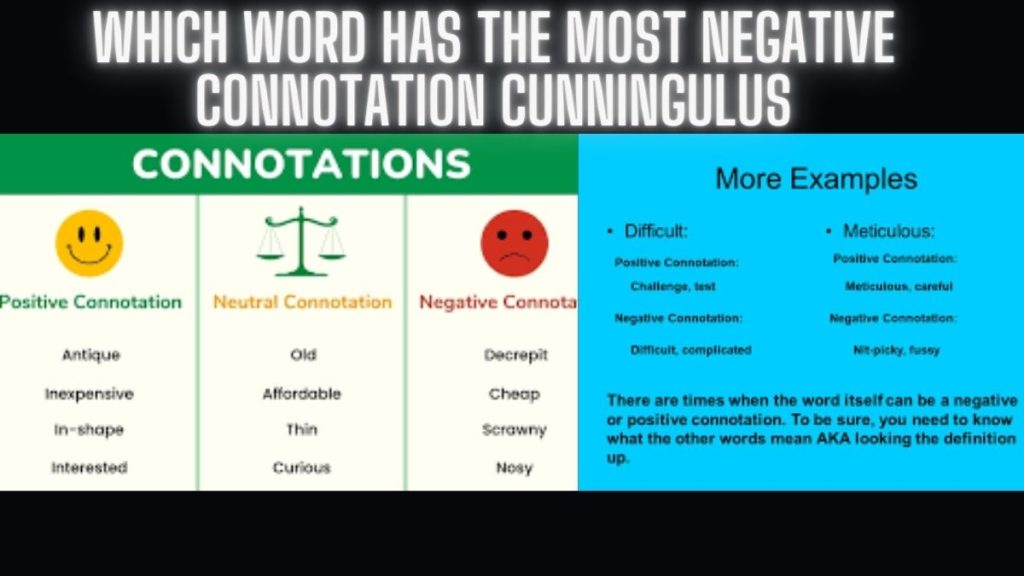Words have a great deal of power; they have the ability to alter perceptions, affect emotions, and convey complex meanings. Cunningulus is one of those words in language that makes people feel strongly. In order to understand why this strange term has such a bad reputation, we shall examine its ramifications in this article. Come along with us as we which word has the most negative connotation cunningulus.
What is “Cunningulus”?
Let’s define the term “cunningulus” before moving on to its negative connotations of which word has the most negative connotation cunningulus. It’s a rare term, but it appears to be a combination of “cunning” and “annulus.” While “annulus” alludes to a ring or circular shape, “cunning” often relates to slyness or deceit. This compound word implies something questionable or dishonest in a cyclical or repeated manner.
The Negative Connotations
Deception and Trickery
Deception is one of the most common negative associations with the word “cunningulus”. The phrase has a cunning or deceitful connotation that can be uncomfortable. When someone is called “cunningulus,” it means that they engage in dishonest behavior, frequently for their own benefit.
Manipulation
The word “cunningulus” also implies manipulation. People with this title are seen as professionals at influencing others to their benefit. This may entail psychological tricks and clever methods designed to accomplish covert goals.
Lack of Trustworthiness
The extreme lack of trustworthiness associated with “cunningulus” adds still another degree of negative. This word implies that the person being referred to is unreliable since they are likely to be harboring secret intentions and ulterior motives.
Shifty Behavior
The term connotes deceitful activity, implying that a “cunningulus” person is always on the lookout for ways to promote themselves. This could show out as evasive behavior, a propensity to shift positions frequently, or a disposition to avoid accountability.
Perplexity and Burstiness of “Cunningulus”
The word “cunningulus” reflects linguistic confusion and burstiness. It has curiosity because of the unusual word choice and associated ambiguity. It adds to its burstiness when people pause when they encounter it to consider what it means.
“Cunningulus” has a burstiness to it due to its occasional use and lack of widespread recognition. Readers are forced to reevaluate the language’s goal and purpose in light of the disruption it causes to the language’s flow.
Conclusion
Words have power in the world of language, and which word has the most negative connotation Cunningulus is no exception. This phrase is a potent language device because of its negative implications, which include deceit, manipulation, lack of reliability, and shifty behavior. It further amplifies its impact and makes a lasting impression on people who experience it due to its confusion and burstiness.
It is crucial to be aware of the words we use and their connotations as we maneuver across the complex linguistic terrain. “Cunningulus” encourages us to investigate the hidden meanings behind the words we come across by serving as a reminder of the subtleties and complexity of language.
FAQs
Is the word “cunningulus” real?
The word “cunningulus” is not listed in any mainstream English dictionaries. It seems to be a combination of words or a newly coined phrase with particular connotations.
2. Why is “cunningulus” a pejorative term?
The term “cunningulus” has a bad reputation because of its links with dishonesty, trickery, lack of reliability, and duplicitous behavior.
3. Can the meaning of words like “cunningulus” evolve through time?
Word meanings can change as language changes. Words like “cunningulus” would need to become widely known and used, though, in order for their implications to alter.
4. Does the word “cunningulus” have any positive connotations?
The word “cunningulus” is typically used negatively to refer to cunning and dishonest activity. Positivity is unlikely to be implied.
5. How can we communicate without using terms that have bad connotations?
Understanding the meanings and implications of the words you choose is crucial if you want to avoid using phrases that have bad connotations. In order to effectively communicate the intended message, carefully select your words and take into account the context in which they are used.







